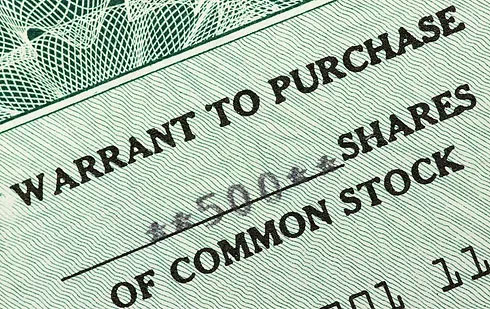The majority of stock warrants operate in a manner that is analogous to that of call options in the sense that they grant the investor the freedom but not the responsibility to purchase a corporation's shares at a predetermined price (the strike price) before the expiration of the warrant.
What are Stock Warrants?

A stock warrant can be considered an agreement between an applicant and a corporation. It grants an individual to purchase that company's stock at a particular value. The price is referred to as the "market price," while the deadline is referred to as the "expiration date."
Warrants on stocks come in a few different varieties, and they're all seen as forms of alternative investing. Holding a call warrant enables you to purchase shares of stock at a special price, while maintaining a sell warrant does the opposite, allowing you to sell the stock at the strike price. The person is under no obligation to complete these exchanges. They are perfectly within their rights to make such a decision.
Characteristics of Stock Warrant

A warrant holder "exercises" it when they notify the issuer of their intent to buy the shares. As the number of currently outstanding shares increases whenever a warrant is activated, so does the market value of the particular value. The exercise Stock Warrants price is set within a short time following the bond's issue.
- The term "premium" refers to the additional amount of money that must be paid for stocks when they are purchased through a warrant instead of in the traditional manner (for example, in a marketplace and from a different shareholder).
- Options, such as warrants, can be used as bargaining chips. Warrants are an alternative to stocks or shares that may be used to calculate a holder's ownership of the company's securities.
- The number of warrants already required to acquire or trade one share of stock is referred to as the exchange ratio.
- Warrants have a time limit beyond which the right to exercise stock warrant options will no longer be available.
- Warrants might be somewhat different depending on the nation that you are in.
Conditions for obtaining a warranted change from nation to country. For instance, the holder of a United States warrant may execute the contract at any time before its validity. Still, the holder of a European-style warrant may do so only on the warrant's expiry date.
Why do Companies Give Out Stock Warrants?
There are several different motivations for which businesses may choose to offer stock warrants. To raise funds, which is one of the most common uses for them, the corporation will often provide a share warrant on the international market. Warrants to purchase company shares are a reward that is occasionally offered to employees by their employers. For instance, a company may provide equity warrants to newly hired workers as a perk of work or share contracts with currently employed workers as part of a strategy designed to keep them in their jobs.
It is not unusual for businesses to utilize a share warrant in the European model when they hire a new worker. In many cases, corporations may give stock warrants to newly hired employees, but the individual will not be able to exercise the contracts for many years. This incentivizes the individual to remain with the company for a sufficient time to take advantage of the perks.
Certain businesses will offer warrants to increase the desirability of investing in bonds or equity investments. Sometimes companies will use warrants as a funding mechanism for acquisitions.
Purpose of Issuing Stock Warrants
- Warrants to purchase shares of stock may be issued by a company for various reasons.
- To raise money, businesses frequently issue stock warrants, which they then sell to investors.
- Warrants to purchase a company's shares are a benefit occasionally given to workers.
- Warrants on the company's shares are one possible perk for new hires, and they're also sometimes used as part of retention initiatives for current staff.
- It is not unusual for corporations to utilize a stock warrant in the European model when they hire a new employee. If you want to encourage new hires to stay for the long haul, corporations may sometimes provide them with stock warrants with extensive lock-up periods.
- Some businesses issue warrants to entice investors to acquire notes or preferred equity.
- Firms sometimes issue warrants to finance purchases.
What Must Be Done to Transfer or Use a Warrant?
If the current stock price is higher than the discount rate of the warrant, the warrant holder may decide to exercise the contract. Warrants, like options, may be exchanged. Therefore, an alternative is for the holder to sell them.
If the stock price is now lower than the market price, acquiring the shares through the stock market would be more cost-effective than exercising the option. If the warrant strike price is $50, but the stock sells at $20, it would not make financial sense to use the contract to acquire the shares at $50.
However, if the stock price is $60 and the contract's strike price is $50, it makes financial sense to activate the warrant. However, just because the stock price is higher than the strike price now doesn't imply the warrant would have to be called. If there is a long time left till the warrant ends, it may be in your best interest to cling to it.
Take Assistance from Trader

Your broker will be your best option for putting your warrants to use. They will deal with the necessary documentation and communication with the warrant-issuing corporation on your behalf. Like stocks and options, warrants can be traded through a trading account. Get in touch with your broker and let them know you'd want to activate the warrants you've accumulated.
Indicate the percentage of your total holdings that you wish to put into play. After the broker has spoken with the issuer, the warrants will be removed, and the shares will be credited to the account. A price may be associated with having your broker do this for you.



